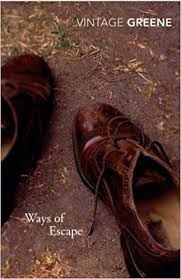
A few months ago I read the first part of Greene’s autobiography, A SORT OF LIFE, that covered his upbringing, first job and first novel. The picture that emerged was of a rather sad young man. WAYS OF ESCAPE is the second installment, and here we find a rather sad middle-aged man.
It’s yet another depressing example of the fact that success apparently doesn’t make you happy. BUT WHY NOT? It seems so unfair. Also a life of glamour and incident doesn’t work, as both of those Green had in spades. He was a successful novelist, and a journalist, and a spy, spending his life in many interesting locations (Vietnam, Sierra Leone, Liberia) among many interesting people. And yet he seems to frame it all as various escapes; he writes books to get away, he goes to dangerous places to get away, but all the while you can’t tell what it is he is trying to get away from.
Mostly I think he is trying to escape that most dogged pursuer, his self. Also, based on his novels, I’d be willing to bet his marriage is pretty unhappy. We don’t find out this juicy stuff though, because as he tells us “I felt that the .. years belonged as much to others as to myself. I couldn’t infringe their copyright. . . They had a right to privacy, and it was impossible to deal with my private life without involving theirs.” How charmingly old-fashioned and thoughtful that seems, especially after just reading THE END. So instead the autobiography is an account of how his novels came to be, which is interesting in itself.
And in learning about the work, you learn something about the man. As a former theatre person myself, I was especially touched to see how he came to love the stage – not as an art form, but as an experience. Let’s end with this rather lovely reflection:
I had imagined that to write a play and to write a film would be very similar: the author, though he could not be excluded from rehearsal, would be an unwelcome stranger lurking ashamed in the studio. . . I had not anticipated the warmth, the amusement, the comradeship of the theatre. Above all I had not realized that the act of creation, as with the novel, would continue for long after the first draft of the play was completed, that it would extend through rehearsals and the opening weeks of the tour. It is for that act of creation that one lives, and after the author has returned from tour, how empty the hours are, the telephone rings seldom – couldn’t we have delayed launching a little longer for the sake of the fun?
Poor guy
